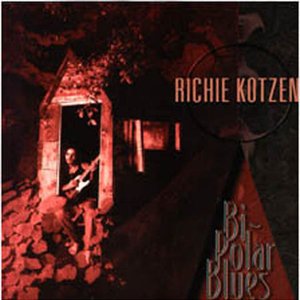Published on Dec 4, 1999
There is an inherent danger whenever any guitarist thinks that
they can naturally play the blues, then record an album to prove
they can do so. The danger is that they often lack the emotion and
the spark, both of which are essential to the genre. Stevie Ray
Vaughan had it; George Thorogood has it.
Richie Kotzen, on the other hand, doesn’t have it – and that’s
where his latest solo album
Bi-Polar Blues, goes terribly wrong. Without the soul to put
in the emotion, your efforts are to waste – and this disc just
smacks of what could have been.
Kotzen – who once seemed like he had found his niche in the
glam-rock band Poison until he got bounced from the group – makes a
few key mistakes on this disc. First, he tries to do damn nearly
everything himself. He plays every single note except for drums on
five tracks and bass on two. Unfortunately, it’s rare that someone
can accomplish such a feat without spreading themselves too thin
among all the bases they try to cover, and
Bi-Polar Blues sounds as thin as a saltine at times.
A bit harsh, perhaps? Think of it this way: in the late ’80s,
Kotzen was one of the young guitar wonderkids who were being hailed
as the next Eddie Van Halen. On this disc, Kotzen rarely sounds
like he’s come ready to kick some serious axe. In fact, the
meatiest solo he whips out comes on “The Thrill Is Gone” – and that
song just doesn’t seem like it calls for a lesson in pentatonic
scales. Other times, the guitar work pales in comparison to what
this guy can do on the six-string. I won’t even go into the bass,
keyboards and drums. I’ll talk about the vocals in a minute.
What Kotzen would have been better off doing on
Bi-Polar Blues is hiring a crack band who could work magic
with this music in their sleep, allowing him to concentrate on some
fantastic guitar work. I know the old saying about too many cooks
spoiling the broth, but sometimes you’ve got to have additional
help in the kitchen.
As for the vocals, I found Kotzen’s singing to be a little bland
– not bad, but like his heart wasn’t really into this material. If
he insists on acting as lead throat and lead guitar, he really has
to make his vocals sound more powerful. Otherwise, there’s no shame
in bringing in a vocalist.
Problem number two on
Bi-Polar Blues is the choice of covers. Now, I’ll freely
admit I’m biased when it comes to “The Thrill Is Gone”; although he
didn’t write it, that track will forever be B.B.King’s, at least in
my mind. Two other tracks, “Tobacco Road” and “They’re Red Hot,”
just seem to be odd selections – and both have been done by other
groups, David Lee Roth and the Red Hot Chili Peppers, respectively.
The difficulty is that you can do only so much with these numbers
before it sounds like you’re filling time – namely, “They’re Red
Hot”. Of the covers, Kotzen does do a respectable job on “From Four
Till Late,” an old Robert Johnson cut.
The originals on
Bi-Polar Blues suffer from the same half-hearted emotion
that the covers do; it’s not until late in the album that Kotzen
seems to turn on the juice and make things interesting. Tracks like
“Burn It Down” and “No Kinda Hero” prove that there still is
promise in the young man’s future, while the instrumental “Richie’s
Boogie” proves that he can still make the house rock.
Granted, Kotzen has been through a lot musically, including hard
rock falling out of commercial fashion. But if artists like Joe
Satriani and Gary Hoey have been able to roll with the punches,
Kotzen should have been able to as well.
Bi-Polar Blues is not the album that is worthy of putting
Kotzen back into the spotlight for good reasons, but there’s enough
on the disc to suggest that he still has an ace up his sleeve. If
only he had chosen to play it.
